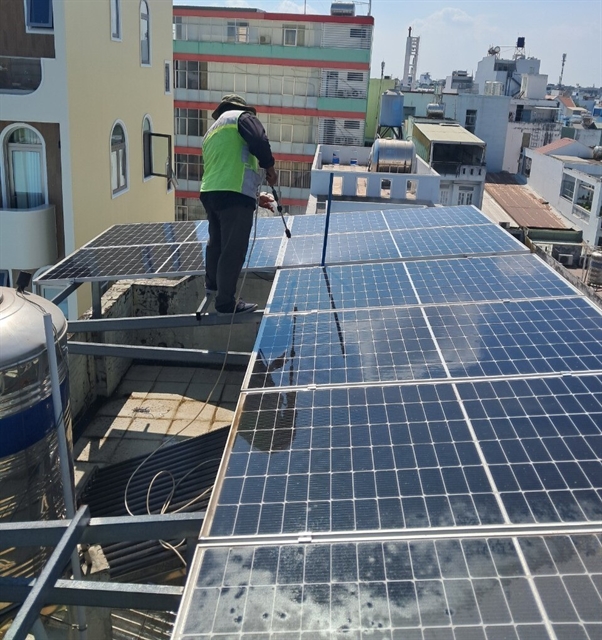 Society
Society

 |
| A worker installs a rooftop solar system for a household in HCM City. — VNA/VNS Photo |
HÀ NỘI — The Ministry of Industry and Trade has proposed a new package of financial incentives, including direct cash support and preferential loans, to encourage households to install rooftop solar power systems.
The draft applies to rooftop systems designed for self-production and self-consumption, as well as systems with electricity storage. Compared to earlier proposals, the new draft offers broader financial assistance and technical support.
Under the plan, households installing rooftop solar would be eligible for short-term commercial loans in Vietnamese đồng at preferential interest rates for up to three years.
For systems without storage, loans would be supported at a rate of at least VNĐ4 million (US$151) per kilowatt peak (kWp) of installed capacity, capped at 5kWp.
Households adding storage systems would receive the same benefits plus at least VNĐ2 million ($76) per kWh of storage capacity, up to 10kWh.
Those wishing to sell surplus electricity would receive support to install two-way meters that measure power flow in both directions, ensuring compatibility with the national grid.
Installation itself would also be subsidised, with households receiving between VNĐ1 million and VNĐ1.5 million ($38-$57) for systems without storage, and an additional VNĐ1–1.5 million for those with storage.
Local development budgets would provide the funding, while technical support would also be available on request during installation and operation.
The ministry calculated that to reach its target of 50 per cent of households – around 14 million – installing rooftop solar by 2030, the total cost of direct support from 2025 to 2030 could amount to VNĐ42 trillion ($1.6 billion).
This would require about VNĐ8.4 trillion annually, with each province expected to allocate an average of VNĐ250 billion per year. Officials argued that the figure is manageable for local budgets and can be balanced by the Ministry of Finance.
Earlier drafts had proposed much lower levels of support, prompting the Ministry of Finance to question whether the scheme would be meaningful.
The finance ministry also pointed out that the cost of rooftop solar currently ranges from VNĐ12–15 million ($454-$568) per kWp, with household systems of 5–10kWp requiring investments of VNĐ60–150 million ($2,271-$5,677).
Payback periods average about five years, assuming households self-finance their systems.
In response, the Ministry of Industry and Trade noted that rooftop solar systems can typically recover their costs within four to five years, while equipment lifespans extend to 10–12 years, making them a sound investment.
For that reason, the ministry believes preferential loan packages may be more effective than direct cash subsidies in spurring adoption.
If the scheme goes ahead, the combined output from average household systems of 3kWp could top 50 billion kWh annually, equivalent to 16 per cent of national electricity demand in 2024.
Officials said such distributed power sources would reduce investment and operating costs for transmission networks, cut reliance on expensive electricity purchases and help lower the country’s net emissions.
"For households, rooftop solar will reduce electricity bills, especially for heavy users who fall into higher tariff brackets," a ministry representative said.
"But with upfront costs averaging around VNĐ50 million ($1,892) per household, many will still need access to preferential loans in order to invest." — VNS